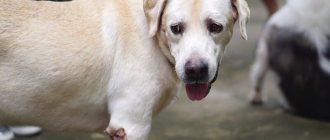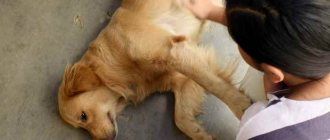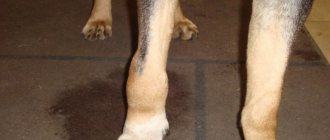The dog has no appetite: a natural condition or a sign of disease
If the dog has lost its appetite, but there are no external signs of illness, then it was caused by other reasons. The following can lead to reluctance to eat:
- The weather is too hot. The dog may lose the desire to eat when the air temperature rises above thirty degrees Celsius. This is why many animals eat much less in the summer.
- Regular use of vitamin complexes. They contain a huge amount of micronutrients, and therefore the pet does not eat so often.
- The beginning of sexual hunting. Loss of appetite in animals is often associated with increased hormonal processes. For example, during the heat period, most dogs are more concerned about meeting their needs rather than eating.
- Eruption of new teeth. Puppies begin teething at an early age. Quite often this process is accompanied by nausea and a general deterioration in well-being. This leads to the dogs refusing to eat.
- Breed predisposition. Some terriers and large breeds deliberately practice fasting. Such dogs may refuse food for several days to improve their health.
Additional Information! All of the above reasons do not require outside intervention. The dog will regain its good appetite on its own.
Lack of appetite in dogs
Anorexia (lack of appetite) is a common complaint among pet owners. This is one of the first signs that owners notice, and therefore one of the most common reasons for visiting veterinary clinics.
- Causes of anorexia in dogs
- Diagnostics
- Treatment
Causes of anorexia in dogs
Lack of appetite in a dog is not a specific sign of any disease. There are several reasons for this behavior of the animal. Let's try to understand the most common ones. Environmental/Weather Changes Hot, humid weather can cause your dog to lose his appetite. This is not uncommon for pets living in an apartment; they are usually less active and therefore eat less during hot summer weather. As a rule, with lower temperatures, appetite returns to normal. Stress and depression If there is a sudden change in its usual lifestyle, the animal may stop eating. This happens in the event of the loss of an owner or a long separation from him, which is why the animal feels depressed and, as a result, refuses to eat. Other stressors, such as moving, getting a new pet, or having a baby, can also lead to anorexia. Changing the diet If a dog has lost his appetite after a sudden change in diet, this may indicate that the new food is less pleasant to the animal than the usual one it was eating before. In this case, a slow, gradual change from one diet to another can help eliminate food refusal. Food Tolerance and Food Allergies Just like in humans, certain types of foods can cause gastrointestinal irritation in dogs. For example, fatty foods can lead to the formation of gases and cramps in the intestines and, as a result, cause a lack of appetite in the dog. Some animals may be allergic to certain proteins found in pet foods (chicken, beef, wheat, corn or soy, for example). In this case, the manifestations of allergies can be different - from anorexia to vomiting and diarrhea. Side effects of medications Some long-term medications, such as heart failure medications and anti-inflammatory drugs, can irritate the stomach and intestines and cause you to stop eating. Feeding treats and food from the human table is often the reason that the animal stops eating the food intended for it. Often, animals are simply too full of treats to eat their regular food. Cracks and damage to teeth If your dog has lost his appetite, it is necessary to rule out problems with teeth and gums. Overly worn or broken teeth cause pain when eating, causing your pet to refuse to eat even when hungry. Diseases There are many diseases of the gastrointestinal tract, kidneys, heart, liver, teeth, as well as cancer, in which the general condition of the animal worsens and, consequently, appetite decreases or disappears completely. Some of these diseases can cause nausea, causing animals to stop eating. Others cause painful lesions or ulcers in the mouth, which also interfere with food intake.
Diagnostics
If your dog has no appetite, the first thing to do is find the cause of his anorexia. Healthy animals usually have a good appetite. For diagnosis, it is important to conduct a thorough physical examination of the animal, paying special attention to the oral cavity, enlarged lymph nodes, and the condition of the gastrointestinal tract. A comprehensive examination cannot do without blood tests, ultrasound and x-ray examinations, and in some cases endoscopy of the gastrointestinal tract and other diagnostic methods are indicated.
Treatment
Treatment must be aimed primarily at eliminating the cause. Only in this case will it be correct and effective. Without identifying the disease underlying anorexia, most treatment options will be successful for a short period of time or fail altogether.
While you are waiting for laboratory results or in mild cases of anorexia, you can use some tips to improve your appetite :
1) Moistening the feed. You can stimulate your appetite by adding a little warm water to your dry food.
2) Heating food. Some animals eat food better if it is slightly warmed up.
3) Canned food. Animals that are accustomed to dry food may be interested in canned food, pates and various dog treats.
4) Change the shape/size of the bowl. This is not always effective, but in some cases changing the usual bowl to a larger one or to a plate/dish can be effective for picky animals.
5) Adding nutritional supplements designed specifically for animals.
The article was prepared by doctors of the therapeutic department "MEDVET" © 2014 SEC "MEDVET"
What to do if your pet has no appetite for a long time
Ear diseases in dogs can lead to refusal to eat.
If the dog is lethargic and does not eat for 3-5 days, this may indicate the development of an illness. To make the diagnosis easier in the future, you need to do the following:
- Carefully check dry food and other dog food. It is necessary to exclude from the diet all foods that can lead to problems with the functioning of the gastrointestinal tract.
- Observe your pet's behavior at home. Weakness and apathy can be a symptom of the development of diseases.
- Conduct an examination of the oral cavity. It is necessary to carefully examine the teeth and gums to ensure that there are no inflammatory processes.
- Inspect the ears. Particular attention should be paid to the ears, as some diseases of the auditory organs can cause pain while chewing food.
- To measure the temperature. Some diseases are accompanied by elevated body temperature.
Important! Even if there are no visible signs of disease development, you need to call a veterinarian for a consultation.
When is it time to see a doctor
A dog can go without food for a couple of days, but it is better to try to immediately determine why it does not want to eat. If, in addition to loss of appetite, other symptoms appear, this is a reason to go to the doctor.
Alarming symptoms:
- elevated temperature,
- diarrhea or vomiting,
- discharge from the nose and eyes,
- stool disorders,
- lethargy and apathy,
- labored breathing,
- refusal of water,
- the dog is nervous when you touch it - most likely, something hurts.
No one knows your pet like you. If you notice changes in behavior, do not delay treatment and do not try to figure it out on your own; it is better to consult a doctor immediately.
If you need advice on dog nutrition, you can always ask your SUPERPET veterinarian.
Did you like the article? Tell your friends:
Comments
When to start getting nervous
A decrease in activity may indicate that the appetite has disappeared due to health problems.
If your pet dog does not eat for several days, but at the same time feels well and remains in a normal mood, there is no need to worry. However, if your dog has lost his appetite and is exhibiting other symptoms, he will need help from a veterinarian.
Symptoms to watch out for include the following:
- fever;
- shiver;
- vomit;
- mucus in stool;
- refusal to drink water;
- decreased activity;
- increased anxiety;
- lethargy.
Additional Information! When loss of appetite is accompanied by vomiting of bile, there is no need to panic. This happens due to prolonged fasting.
Behavioral and physiological factors influencing food intake
Depression often leads to a decrease in appetite.
Factors that can cause a dog to refuse to eat include the following:
- Depression or frequent occurrence of stressful situations. Animals that are depressed often refuse to eat or drink.
- Poor quality products. Some people decide to save money on pet food and buy cheap food for them. Sometimes this leads to poisoning, abdominal pain and further loss of appetite.
- Using the same food. If you don't give your dog a varied diet and constantly give him the same food, he may stop eating.
- Parasites. The dog may lose its appetite due to worms. To avoid them, you need to regularly check your pets for parasites.
- Consequences after taking medications. Some medications cause the dog to stop eating.
What can't you do?
Basic prohibitions that dog owners must adhere to:
- Don't feed your dog from your table. Most animals will prefer a piece of steak and mashed potatoes to a balanced dog food. The dog will express his gratitude for the treat in every possible way. Over time, the habit will lead to the dog constantly begging for food.
- Supervise your children so that they do not feed the complaining dog.
- If the dog does not eat, there is no need to offer him treats and junk food to encourage him.
- Do not force feed your dog unless recommended by a veterinarian. Overeating is much more harmful to a dog's body than starvation.
What can veterinarians offer?
Often people are unable to independently determine why their dog has lost its appetite. In such cases, you will have to seek help from a veterinarian. A specialist will help not only to understand the causes of the problem, but also to return the former desire to eat food.
To determine the main causes of lack of appetite, the doctor will conduct the following examinations:
- general analysis of urine and blood;
- determination of the amount of hormones in the blood;
- X-ray examination to exclude tumors and the need for surgery to remove them;
- Ultrasound of the abdominal cavity;
- examination of the anus and intestines to detect worms.
Important! Depending on the diagnosis, the doctor must prescribe effective treatment.
How to restore a dog's appetite if it is healthy
Active rest helps improve appetite.
There are often cases when a dog is completely healthy, but practically does not eat. There are several effective ways to help normalize nutrition in male and female dogs:
- Feed your pet at the same time every day.
- If the dog has not finished eating, the bowl should be removed from under its paws and hidden until the next meal.
- Do not allow your dog to snack between meals so that it does not spoil his appetite.
- Do not overfeed your pet. You need to apply exactly as much as he can eat at one time.
- Spend a lot of time with your dog in the fresh air so that he moves more and does not sit at home.
Additional Information! To make your dog want to eat more often, you need to buy his favorite food. This can increase your pet's appetite so much that it starts drooling.
What to do if your dog has lost his appetite
If your dog appears fairly healthy and has no other health problems, then the following is necessary:
- Watch the dog, maybe it ate something on the street, maybe by the next meal the animal will have an appetite.
- Try heating the food, sometimes picky dogs really like warm food.
- Try not feeding your dog for about 12-24 hours. Give the animal a chance to get hungry.
- Provide your dog with 24/7 access to fresh water.
- Always make sure your dog doesn't eat while walking outside.
Danger to humans
Most often, a dog’s lack of appetite does not pose any danger to humans. However, there are cases when the reason for refusing food and water is rabies. In order to promptly determine that your pet has developed this disease, you need to become familiar with its main symptoms. Signs of rabies include the following:
- Cold look. Animals with rabies most often have a blank and cold look.
- Irritability. Dogs become more irritable and begin to bark more often.
- Diarrhea. One of the signs of rabies is indigestion accompanied by diarrhea.
- Weight reduction. Because rabies can cause dogs to completely lose their appetite, they quickly lose weight.
Preventive measures
The veterinarian will help determine the reason for refusal to eat.
Every dog owner should do everything to ensure that his pet always has a good appetite. To do this, the dog must be fed regularly, without taking long breaks between meals. It is better to develop a schedule for eating food so that the dog does it at the same time.
You need to feed your dog warm and tasty food. If a dog turns up its nose and stops eating, it means it doesn’t like the food. In this case, you will have to slightly change the daily diet and add more of your dog’s favorite foods. The diet should consist of:
- lean raw meat;
- buckwheat or rice porridge;
- raw or boiled vegetables.
When to contact a veterinarian
Many people do not know when to seek help from a veterinarian if their dog’s appetite disappears.
If your dog has lost its appetite, it is not necessary to visit a doctor immediately. Perhaps this is a temporary phenomenon that is not associated with disease. However, if the dog’s health worsens and his stomach begins to grumble, then you need to consult a specialist. At the same time, time can be running out and therefore there is not a minute to waste. You need to immediately take your pet to an experienced veterinarian so that he can figure out why the dog has no appetite and what needs to be done to get it back.
Lack of appetite in a dog is a common phenomenon that almost every dog owner has encountered. Before solving this problem, you need to familiarize yourself with the main reasons for your dog’s refusal to eat.
Why does a dog refuse to eat?
If you notice a dog has poor appetite, the first thing to do is find out the reason. It can be both harmless - then the problem is eliminated by itself, and quite serious, when it is impossible to solve the situation without the intervention of specialists.
A dog's loss of appetite is not always related to illness. Natural reasons are:
- Heat. If the temperature outside is over 30 degrees, this can already cause a short-term lack of appetite in the dog.
- Estrus. Often the animal refuses to eat during the period of sexual heat. When it ends, the pet returns to its usual diet.
- If the animal receives additional vitamins and minerals, it can become saturated with nutrients and refuse regular food.
- Features of the breed. Some animals may simply refuse to eat. Most often this is done by representatives of large breeds.
- Teeth growth. At this time, puppies often feel unwell and try not to eat, as the sensations can be quite painful. The problem disappears on its own after the teeth form.
Additionally, a dog's loss of appetite may be related to stress. This problem can be caused by a recent move, the arrival of a new pet in the family, or a change in food. These situations are natural; the owner is not required to treat the pet or visit a veterinary clinic. What is the best way to stimulate a dog’s appetite in this case? You can try giving her some kind of treat. Once the cause is eliminated, the pet's appetite usually returns.
If a dog has a dry nose, lethargy, and has not eaten for 3-4 days, then there is already reason to be worried. The owner must do the following:
- The first step is to check your pet's food for freshness. Eliminate foods that are questionable, including those that were given to the animal for the first time - perhaps he just didn’t like something.
- Watch your pet. If, despite the fact that the dog has lost its appetite, it still develops apathy and lethargy, then these are signs of illness. Your dog may also have a dry nose, which is also an indicator of a problem.
- It is necessary to examine the oral cavity to see if there is inflammation or problems with the teeth.
- Check the animal's ears - diseases that develop in the hearing organs can cause pain when chewing food.
- A dog that has a dry nose and no appetite should have its temperature taken. Normal indicators should be as follows: small breeds - 38.6 - 39.3 (puppies), 38.5 - 39 (adults); averages - 38.3 - 39.1 and 37.5 - 39; large - 38.3 - 39.1 and 37.4 - 38.3. The temperature may rise slightly in hot conditions, during stress, or after intense physical activity.
- The pet should be examined for volvulus. This is done as follows: the pet is laid on its side and the stomach is felt. If your dog is acting irritable, this may indicate a problem. You need to urgently seek help from a veterinarian.
What to do if lethargy, restlessness or other signs of illness are not detected, but the dog still has poor appetite? You should definitely visit a veterinary clinic.
When do you need veterinary help? The owner must immediately take the pet to the veterinarian if, in addition to refusing food, the animal has vomiting, fever, lethargy, restlessness, or shows anxiety or aggression.










